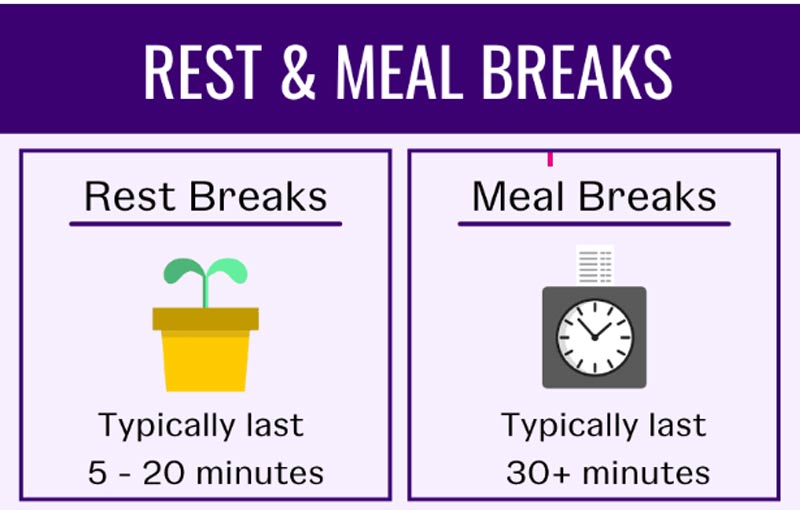According to the Federal break law, as mentioned in the Fair Labor Standards Act (FLSA), the employer isn't required to offer breaks to their employees. If employers choose to provide breaks, they must be compensated unless they are at least 30 minutes long and the employee is completely relieved of duties. Short breaks (typically 5-20 minutes) must be paid.
The Fair Labor Standards Act (FLSA) is a federal law in the United States that sets standards for minimum wage, overtime pay, recordkeeping, and youth employment in the private sector and across federal, state, and local governments. While the FLSA does not require employers to provide their employees with lunch or rest breaks, it does regulate them if they are provided.
Here are some key points about the federal break law under the FLSA:

Rest break often lasts 5-20 mins, while lunch break lasts at least 30 mins
The Fair Labor Standards Act (FLSA), a federal labor law in the United States, does not mandate that employers offer lunch or meal breaks. However, if an employer opts to provide a meal break (typically lasting 30 minutes or more), the FLSA stipulates that the break should be unpaid, provided the employee is fully relieved of their job duties during this time. If work duties interrupt the meal break, then the time must be compensated.
It's important to note that while the FLSA establishes minimum standards for wage and hour regulations, some states have their own laws that offer additional protections for employees, including regulations for meal breaks. In instances where state laws provide greater protections, those laws will take precedence.
Employers covered by the FLSA must maintain accurate records of employees' hours worked, wages paid, and other specified information as required by the law. This includes any meal breaks provided to employees.
Overall, while the FLSA does not mandate lunch or meal breaks, it does regulate them if they are provided by an employer. Employees should be aware of their rights under both federal and state laws regarding meal breaks, and employers should ensure compliance with all applicable laws and regulations.
Under the Fair Labor Standards Act (FLSA), which is the federal law governing wage and hour requirements in the United States, employers are not required to provide rest breaks to employees. However, if an employer chooses to provide short breaks (usually lasting 20 minutes or less), the time is considered compensable work time, and employees must be paid for these breaks.
It's important to note that while the FLSA does not require rest breaks, some states have their own laws that mandate rest breaks for employees. In cases where state laws provide more generous protections for employees, the state laws will apply.
Employers covered by the FLSA are required to keep accurate records of employees' hours worked, wages paid, and other information specified by the law. This includes any rest breaks provided to employees.
Employers in the United States have certain responsibilities under federal law regarding break times for employees. While the Fair Labor Standards Act (FLSA) does not mandate that employers provide breaks, if they choose to do so, they must comply with certain guidelines.
For example, employers should provide reasonable break times and durations, typically offering a meal break of at least 30 minutes for employees to eat and rest, as well as shorter rest breaks (usually 20 minutes or less) if desired.

Employers should offer employees reasonable durations of break times
If employers provide meal breaks, they must ensure that the breaks are unpaid unless the employee is required to work during the break. Employers should also ensure that employees are completely relieved of their job duties during meal breaks. Rest breaks, if provided, must be paid, and employers should not interrupt employees' rest breaks with work duties.
Employers should also be aware of and comply with any applicable state laws regarding break times, as some states have specific requirements for meal and rest breaks that may differ from federal law. Finally, employers covered by the FLSA are required to keep accurate records of employees' hours worked, wages paid, and other information specified by the law, including any break times provided to employees.
Under federal law, specifically the Fair Labor Standards Act (FLSA), employees have 5 certain rights regarding breaks.
1. Meal Breaks: The FLSA does not require employers to provide meal breaks. However, if an employer does provide a meal break (typically 30 minutes or more), it is unpaid unless the employee is required to work through the break. If the employee works during a meal break, they must be paid for that time.
2. Rest Breaks: The FLSA also does not require rest breaks. However, if an employer chooses to provide short breaks (usually 20 minutes or less), they must be paid. These breaks are considered hours worked and are included in the total hours worked for the week.
3. Nursing Mothers: The Affordable Care Act (ACA) amended the FLSA to require employers to provide reasonable break time for nursing mothers to express breast milk for one year after the child's birth. Employers must also provide a private, non-bathroom space for this purpose.
4. Compensability: Whether breaks are paid or unpaid depends on whether they are considered hours worked. Short rest breaks are typically paid, while meal breaks are unpaid if the employee is completely relieved of duties.
5. State Laws: In the U.S., each state has their own labor laws that may provide additional protections to employees. Employers' responsibility is to comply with both federal and state laws, and if there are differences, they must follow the law that provides the most protection to employees.
Exceptions and special circumstances related to breaking laws can vary depending on the jurisdiction and specific regulations. Here are 3 general examples:
1. Exceptions to Federal Break Law Requirements
While the Fair Labor Standards Act (FLSA) mandates that covered non-exempt employees receive breaks, including meal breaks, there are exceptions. For example, employees who are exempt from FLSA requirements, such as certain salaried employees, may not be entitled to breaks under federal law.
2. Accommodations for Employees with Disabilities
Under the Americans with Disabilities Act (ADA), employers may be required to provide accommodations to employees with disabilities, which could include adjustments to break schedules or providing breaks as a necessary accommodation.
3. Break Laws for Specific Industries or Job Roles
Some states or local jurisdictions have specific break laws that apply to certain industries or job roles. For example, some states have specific regulations for healthcare workers, truck drivers, or employees in certain hazardous occupations.
Federal Agencies Responsible for Enforcing Break Laws: The primary federal agency responsible for enforcing break laws is the Wage and Hour Division (WHD) of the U.S. Department of Labor (DOL). The WHD enforces the break provisions of the Fair Labor Standards Act (FLSA), which governs minimum wage, recordkeeping, overtime pay, and youth employment standards in both the private and public sectors.
Penalties for Non-compliance with Federal Break Laws
Employers who violate the federal break laws, such as by failing to provide the required meal or rest breaks, may be subject to penalties. 3 penalties can include:
Examples of Notable Cases Related to Federal Break Law Violations
There have been several notable cases of federal break law violations, including:
These cases highlight the importance of employers understanding and complying with federal break laws to avoid costly penalties and legal action.
Breaking laws in the United States can be complex, as they are governed by both federal and state regulations. The federal break law, established under the Fair Labor Standards Act (FLSA), sets minimum standards for wages and overtime pay, but states are free to enact their own, often more stringent, break laws.
Here's a table comparing federal break laws with state break laws:
Aspect | Federal Break Law (FLSA) | State Break Laws |
Coverage | Applies to most employers; some exceptions for small businesses | Varies by state; some states have break laws that cover all employers, while others have thresholds based on the number of employees |
Meal Breaks | Generally, not required; if provided, must be unpaid and at least 30 minutes for employees to be completely relieved of duties | Many states require meal breaks, typically ranging from 30 minutes to an hour, after a certain number of hours worked |
Rest Breaks | Federal law does not require rest breaks | Some states mandate rest breaks, often 10-15 minutes for every 4 hours worked |
Overtime Considerations | Meal breaks generally not counted as work time for overtime calculations | Rest breaks typically considered working time for overtime calculations |
Enforcement | Enforced by the Department of Labor | Enforced by state labor departments |
Preemption | Federal law preempts state law only if the state law is less favorable to employees | State laws that provide more generous break provisions than federal law can still apply |
Conflict Resolution | In case of conflict, federal law typically takes precedence | State law applies if it provides greater rights or protections for employees |
It's important to note that state break laws can vary significantly, so it's crucial for employers to understand and comply with both federal and state regulations.
Ensuring compliance with federal break laws, as well as state regulations, is crucial for employers to avoid potential legal issues. Here are 8 best practices to help you stay compliant:
By following these best practices, employers can help ensure compliance with federal break laws and minimize the risk of legal issues related to breaks.
How many hours do you have to work to get a lunch break?
Under federal law, there is no specific requirement for a lunch or meal break. However, some states have laws that require employers to provide a meal break after a certain number of hours worked. For example, in California, employees must receive a 30-minute meal break if they work more than five hours in a day.
Can I work 8 hours without a lunch break?
Whether you can work 8 hours without a lunch break depends on the laws in your state. Some states require employers to provide a meal break after a certain number of hours worked, while others do not have specific requirements. In states without specific requirements, it is generally up to the employer to decide whether to provide meal breaks.
How many hours can an employee work without a break?
This depends on the laws in your state. Some states require employers to provide rest breaks after a certain number of hours worked, while others do not have specific requirements. In states without specific requirements, it is generally up to the employer to decide whether to provide rest breaks.
How many hours do you have to work to get a break?
The number of hours you have to work to get a break depends on the laws in your state. Some states require employers to provide rest breaks after a certain number of hours worked, while others do not have specific requirements. In states without specific requirements, it is generally up to the employer to decide whether to provide rest breaks.
In conclusion, employers should follow break time regulations, not only to comply with legal requirements but also to promote a harmonious workplace. Adequate breaks can improve employee morale, productivity, and overall well-being. For further reading or legal consultation, employers can refer to resources provided by the Department of Labor or seek advice from legal experts specializing in labor and employment law. Understanding and complying with break laws is essential for both employers and employees to create a positive and legally compliant work environment.